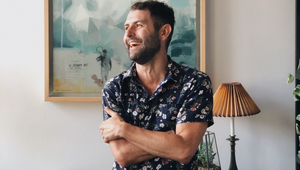
Thinking in Sound: Colin Daniel’s Admiration for the Carnatic Scale

South African sound designer and mixer, Colin Daniel studied film, sound design and video production at AFDA, The South African School of Motion Picture Medium and Live Performance. Since completing his studies, he’s spent the last six years working in the industry. Colin’s work spans audio mixing, sound design and game audio programming, as he’s worked on short films, albums and of course, within the realm of advertising.
LBB> When you’re working on a new brief or project, what’s your typical starting point? How do you break it down and how do you like to generate your ideas or response?
Colin> It’s best to start with a few questions. You want to know what are the most important things a client wants in their mix and why. Understanding the feeling the client is trying to create is one of the most important things. It can help inform your approach to the project and your creative input. Often an edit will come in with scratch (throwaway content meant to just give an idea) SFX put in. It’s super important to pay attention to this. Think of the scratch audio as a wish list. This wish list gives you a great guide for what the client was thinking. But the most important thing to remember is to keep communicating with the client. Sometimes the best ideas come about in the middle of a conversation.
LBB> Music and sound are in some ways the most collaborative and interactive forms of creativity - what are your thoughts on this? Do you prefer to work solo or with a gang - and what are some of your most memorable professional collaborations?
Colin> Collaboration is king. My best experiences have always been collaborative. A few of my favourite projects include Seal Team, which had the whole Pressure Cooker team working on the film at different times or simultaneously and Supa Strikas, which had a very similar workflow. A team approach just lets you put different minds together to solve the same problems. Multiple minds often come to more creative solutions quicker than a single one, and if anyone gets stuck, the others can help with a new perspective. There’s also something to be said for being able to ask another person to listen to a mix after a few hours of dedicated work.
LBB> What’s the most satisfying part of your job and why?
Colin> Hearing the mix come together in the last few stages. This is the point where you get to hear all the magic come together, where you can listen to the elements together or in isolation. We really strive to make every layer immaculate and it’s a wonderful feeling when it all works well.
LBB> As the advertising industry changes, how do you think the role of music and sound is changing with it?
Colin> It is important to note that most of the changes in the advertising industry lately have come as a direct result of the innovations we have seen in the tech space, particularly smartphones and social media. Things like Facebook and Tik Tok have become such important parts of how we consume media that, to many people, these things are the internet. This means that advertisers must find novel ways to advertise on these platforms to be able to blend in with the rest of the content on the platform. This means different things (for sound) in different ads. Another important change brought on by technology is the fact that a great number of ads are running for much shorter times. They need to be able to fit into the endless scroll of many apps while catching the consumer’s attention and creating a memory in an environment where everything is fighting for your attention. In this environment, music and sound need to be bigger, punchier, crispier and, most importantly, brief.
LBB> Who are your musical or audio heroes and why?
Colin> Mick Gordon, Ben Burtt and Akash Thakkar. Mick Gordon created one of the heaviest and most interesting scores for DOOM (2016) and DOOM: Eternal. He gave a talk on GDC about how he and his team went about creating the score, and it’s pure genius. One of his quotes has stuck with me: “Change the process, change the result.” This has become an approach that I try to use with all of my sound design.
Ben Burtt was the lead sound designer at Lucas Films and the lead sound designer on the original Star Wars movies. If you’ve ever heard of a lightsaber or R2D2, you’ve heard of Ben Burtt’s work. Akash Thakkar was the sound designer for a game called Hyperlight Drifter. It’s a really fun and rewarding game and the sound design and music play no small part in creating that feeling of awesomeness for the player. He also gives really good lectures on sound design which I’d recommend to every budding sound designer, especially those who are interested in sound design for games.
LBB> And when it comes to your particular field, are there any particular ideas or pioneers that you go back to frequently or who really influence your thinking about the work you do?
Colin> I would say that the three I mentioned in the previous question are my go-to’s, but since the actual work happens on a case-by-case basis, I end up referencing moments in media I’ve seen rather than the people that made them. A single sound is often more useful as a reference at the moment than a philosophy.
LBB> When you’re working on something that isn’t directly music (let's say going through client briefs or answering emails) - are you the sort of person who needs music and noise in the background or is that completely distracting to you? What are your thoughts on ‘background’ sound and music as you work?
Colin> Not really. It depends on what I’m doing and how I feel at the moment. It’s only unbearably distracting if I have to listen to a sample, a reference or something else that requires my ears. But I’ve also known excellent sound designers who do their best work while listening to music. I don’t understand how they work like that, but the results were usually great, so I didn’t complain. I think that as long as you can get the results, it doesn’t matter if you need a backtrack to do it.
LBB> I guess the quality of the listening experience and the context in which audiences listen to music has changed over the years. There’s the switch from analogue to digital and now we seem to be divided between bad-ass surround-sound immersive experiences and on-the-go, low-quality sound (often the audio is competing with a million other distractions) - how does that factor into how you approach your work?
Colin> It’s an unfortunate reality, but yes this is something we have to consider. There is still a need for high-quality audio, though. There are companies and projects that are working every day to bring high-quality audio to people on the go. Bluetooth headphones, for example, have drastically improved in quality over the last few years. That being said, to cover all our bases we do a lot of testing. Testing, testing, testing. We test on a variety of speakers so that we can get the most accurate idea of how the audio will sound and feel out in the wild. We also pay attention to loudness standards as these really help unify audio across different situations. We always strive to be on the right side of the loudness wars.
LBB> On a typical day, what does your ‘listening diet’ look like?
Colin> This is kind of a tough question. I like to listen to a variety of music on my commute to and from work. I usually listen to rock, jazz, EDM or house. But whatever sounds good. I also like to check out tutorials on new tech or to help brush up on old techniques. There are also the TV shows I watch. There are a lot of talented mixers and sound designers out there and it’s always a pleasure to hear the work of my peers.
LBB> Do you have a collection of music and what shape does it take (are you a vinyl nerd, do you have hard drives full of tunes, are you a hyper-organised spotify-er…)?
Colin> At the moment, I keep my music on Spotify. It’s really convenient for me but I do see the value of having music stored in other forms.
LBB> Outside of the music world, what sort of art or topics really excite you and do you ever relate that back to music (e.g. history buffs who love music that can help you travel through time, gamers who love interactive sound design… I mean it really could be anything!!)
Colin> Video games and films are big ones for me. There are some obvious reasons like the creative sound design that you’ll often find in these media. Another thing that draws me to these art forms is the way that they immerse you in the story and the world. I’m really big on story and I feel like music is one of the most powerful ways to tell stories.
LBB> Let’s talk travel! It’s often cited as one of the most creatively inspiring things you can do - I’d love to know what are the most exciting or inspiring experiences you’ve had when it comes to sound and music on your travels?
Colin> I haven’t travelled much, but I’d say the most interesting thing I’ve heard in my travels was an innovative musician in Bangalore, India, who combined modern rock sounds with traditional Carnatic singing. The Carnatic scale is one of the most recognisably Indian sounds. It’s a beautifully complex form of music and it was really interesting to hear it adapted to a modern context in this way.
LBB> As we age, our ears change physically and our tastes evolve too, and life changes mean we don’t get to engage in our passions in the same intensity as in our youth - how has your relationship with music changed over the years?
Colin> It hasn’t changed much. My tastes may have broadened a little, but I’ve always tried to listen to a wide variety of music. I’ve never been one to stick to a single genre or artist. There are just too many good flavours out there.











